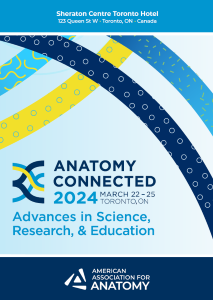Anatomy Education: Teaching Methods & Innovations Posters
Poster: Anatomy Education: Teaching Methods & Innovations Posters
110 - Beyond Traditional Learning: Chatgpt's Role in Advancing Medical Education
Saturday, March 23, 2024
5:00pm - 7:00pm US EDT
Location: Sheraton Hall
Poster Board Number: 110
There are separate poster presentation times for odd and even posters.
Odd poster #s – first hour
Even poster #s – second hour
Co-authors:
There are separate poster presentation times for odd and even posters.
Odd poster #s – first hour
Even poster #s – second hour
Co-authors:
Evan Hicks - UAMS; Vanessa Vyas - University of Arkansas for Medical Sciences; John Lee - University of Arkansas for Medical Sciences; John Norys - University of Arkansas for Medical Sciences; Tiffany Huitt - University of Arkansas for Medical Sciences; Erica Malone - University of Arkansas for Medical Sciences; David Davies - University of Arkansas for Medical Sciences
- HS
Humam Shahare
Medical Student (M3)
University of Arkansas for Medical Sciences
Little Rock, Arkansas, United States
Presenting Author(s)
Abstract Body : PURPOSE: This study evaluates ChatGPT's effectiveness in aiding first-year medical students' adaptation to the demanding environment of medical education. It examines ChatGPT's role in facilitating self-directed learning and enhancing educational engagement, while also assessing students' initial AI familiarity, previous AI interactions, and changing perceptions of AI's relevance in their studies. This approach aims to provide a holistic view of AI's potential in early medical education.
METHODS: Employing a two-stage exploratory approach, this study first surveyed students to gauge their baseline understanding of AI, especially ChatGPT, in medical education. The second stage involved an educational intervention showcasing ChatGPT's applications in simplifying medical concepts, creating study materials, and providing strategic academic guidance. A follow-up survey post-intervention sought students' feedback on ChatGPT's utility, benefits, and areas for improvement.
RESULTS: Survey analysis from 50 medical students revealed significant changes in their perceptions of AI in education. Before the educational intervention, 92% knew of ChatGPT, but only 24% had prior AI experience. After interacting with ChatGPT, awareness increased to 96%, and AI experience doubled to 52%. Significantly, students' understanding of AI's role, strengths, weaknesses and its potential in medical education markedly improved (p-value < 0.05). Post-intervention, there was a statistically significant shift in students' attitudes towards AI, demonstrating a deeper understanding and appreciation of its role in medical education (p-value < 0.05).
CONCLUSION: This study highlights ChatGPT's potential impact on medical education by enhancing student engagement and understanding of AI, with improved perceptions of its utility post-intervention (p-value < 0.05). The findings underscore ChatGPT's untapped potential in advancing medical education and aiding in self-directed learning, suggesting its integration as a valuable asset in medical curricula.
SIGNIFICANCE/IMPLICATIONS: This research underlines the transformative potential of AI tools like ChatGPT in medical education. As seen through the shifts in student perceptions and engagement with AI, the study highlights ChatGPT's critical role in not only clarifying complex medical concepts but also in fostering an innovative, self-directed learning environment. These insights are critical for future educational strategies, integrating AI into curricula, and suggest a paradigm shift towards a more AI-integrated approach in medical education, preparing students for an AI-enhanced healthcare future.
METHODS: Employing a two-stage exploratory approach, this study first surveyed students to gauge their baseline understanding of AI, especially ChatGPT, in medical education. The second stage involved an educational intervention showcasing ChatGPT's applications in simplifying medical concepts, creating study materials, and providing strategic academic guidance. A follow-up survey post-intervention sought students' feedback on ChatGPT's utility, benefits, and areas for improvement.
RESULTS: Survey analysis from 50 medical students revealed significant changes in their perceptions of AI in education. Before the educational intervention, 92% knew of ChatGPT, but only 24% had prior AI experience. After interacting with ChatGPT, awareness increased to 96%, and AI experience doubled to 52%. Significantly, students' understanding of AI's role, strengths, weaknesses and its potential in medical education markedly improved (p-value < 0.05). Post-intervention, there was a statistically significant shift in students' attitudes towards AI, demonstrating a deeper understanding and appreciation of its role in medical education (p-value < 0.05).
CONCLUSION: This study highlights ChatGPT's potential impact on medical education by enhancing student engagement and understanding of AI, with improved perceptions of its utility post-intervention (p-value < 0.05). The findings underscore ChatGPT's untapped potential in advancing medical education and aiding in self-directed learning, suggesting its integration as a valuable asset in medical curricula.
SIGNIFICANCE/IMPLICATIONS: This research underlines the transformative potential of AI tools like ChatGPT in medical education. As seen through the shifts in student perceptions and engagement with AI, the study highlights ChatGPT's critical role in not only clarifying complex medical concepts but also in fostering an innovative, self-directed learning environment. These insights are critical for future educational strategies, integrating AI into curricula, and suggest a paradigm shift towards a more AI-integrated approach in medical education, preparing students for an AI-enhanced healthcare future.

